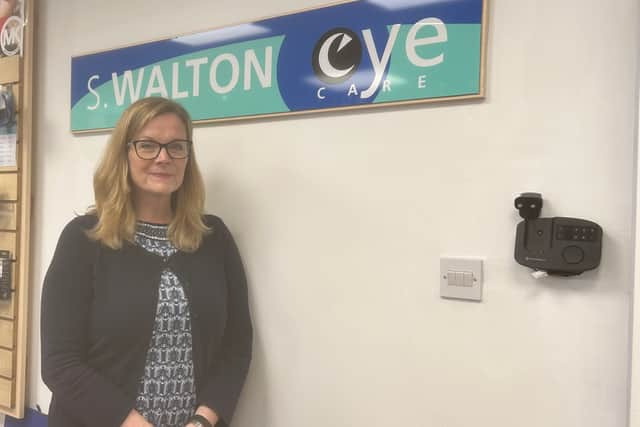South Shields opticians back national campaign encouraging public to have their eyes tested regularly
and live on Freeview channel 276
A national campaign has been launched today to encourage people to ‘get back into the habit’ of having regular eye tests.
South Shields based opticians S. Walton Eyecare is backing the campaign as it hopes to raise awareness in promoting in the importance of looking after our eyes.
Advertisement
Hide AdAdvertisement
Hide AdThe opticians based on Stanhope Road has been part of the community for almost 100 years and has always prided itself in taking care of patients with each practice owner.
Data from Vision Matters shows 4.7m NHS sight tests have been lost since the pandemic disrupted people’s healthcare routines and one in five have postponed or cancelled a sight test in the past year due to cost concerns.
Read South Tyneside's news on the go with our free email newsletters - bringing the headlines to your inbox. Catch up on the day's news and sport and enjoy even more from your Gazette. Visit our website here to find out more and sign up.


Kaye Winship, Optometric Director at S.Walton Eyecare said: "As an optometrist, my personal concern in South Tyneside is for the children who were born late 2015-16 and who started the reception year at school when Covid hit.
Advertisement
Hide AdAdvertisement
Hide Ad"School eye screening services were paused from March 2020 and were only reinstated in September 2022. The purpose of these school screening checks are to detect amblyopia (lazy eye) and other visual problems as early as possible in children. If the school does reveal sight problems, early treatment will lead to better results for a child.
"I’m continuing to encourage that all primary school aged children get their eyes tested once a year but most especially if they’ve not had an eye test before, as time is running out to optimise their vision which can have a bearing on the potential exclusion from certain career choices so it really is vital.
"In the elderly and those who are still reluctant to access health services since Covid there is an increase in serous sight loss due to diseases and eye conditions not being picked up early enough. 80% of sight loss is preventable if detected early enough.
The campaign, part of National Eye Health Week (18-24 September), comes as health analysts predict a million more Brits will suffer one of the four main causes of blindness in the next decade; with cases of late-stage age-related macular degeneration (AMD) – the UK’s leading cause of sight loss – estimated to rise 25% by 2032, early-stage AMD (drusen) up 16%, cataract 25%, glaucoma 17% and incidence of diabetic retinopathy up five per cent.
Advertisement
Hide AdAdvertisement
Hide AdDavid Cartwright, Chair of Eye Health UK, said: “Half of sight loss could be avoided simply by ensuring we have our eyes checked regularly, not smoking, and, keeping ourselves fit and well by eating a healthy-balanced diet, staying active and wearing sun protection.”
Regular sight tests are essential health checks for everyone, even if you think your eyes are fine, as damage may be done before you notice it yourself and your optometrist can detect microscopic changes inside the eye. In fact, they can spot glaucoma years before you notice a change in your vision!
Changes within the eye can lead to refractive error (short- or long-sight), eye disease and other vision ailments, and can also indicate underlying health conditions such as high blood pressure, raised cholesterol, risk of stroke and heart disease.
Advertisement
Hide AdAdvertisement
Hide AdHealth Minister Neil O’Brien said: “Regular sight tests are essential for everyone – half of sight loss could be avoided simply by having our eyes checked regularly – and free NHS testing is already available for several groups including children, people aged over 60 and those on income-related benefits.
“We are also making free eye tests available within all special school settings and during the past five years the National Institute for Health Research has invested more than £100 million into research on eye conditions.”
Anyone worried about the cost of eye care should discuss their entitlement to NHS services and other affordable eye care options with their local optician. Finances should not be a barrier to caring for your vision and eye health.
